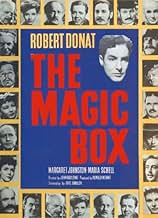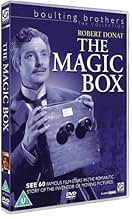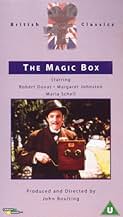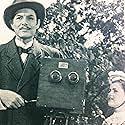IMDb रेटिंग
7.0/10
1.5 हज़ार
आपकी रेटिंग
अपनी भाषा में प्लॉट जोड़ेंA chronicle of the life of William Friese-Greene, a British inventor and early pioneer in cinema.A chronicle of the life of William Friese-Greene, a British inventor and early pioneer in cinema.A chronicle of the life of William Friese-Greene, a British inventor and early pioneer in cinema.
- 2 BAFTA अवार्ड के लिए नामांकित
- 1 जीत और कुल 2 नामांकन
Renée Asherson
- Miss Tagg
- (as Renee Asherson)
फ़ीचर्ड समीक्षाएं
Whether or not William Friese-Greene was actually the father of motion pictures he was certainly in there trying. And though Edison and some French guys get a mention in passing this beautifully-mounted star-laden tribute to dogged endeavour is all Willie's show - made thirty years after his death and timed for the Festival of Britain. It almost missed the bus in this regard and wasn't generally released until the following year,something charmingly British about that. The film itself is charmingly British too, handling its huge cast and period detail with steady quietly-absorbing assurance. Eric Ambler's deftly-crafted script provides romance, comedy, poignancy and an absolutely splendid pinnacle-scene which sums the picture up both in terms of story and production-plan. His dual-flashback structure, which some find confusing, permits the masterly Robert Donat to re-wind from forgotten old codger to eager young whippersnapper and back again with a shift in the middle for 'changing reels' on the assertion of his second wife that "Willie was before my time". This second marriage assuaged his widower-loneliness and certainly produced quite a brood but was blighted by despondency - he's not mentioned in the Encyclopedia - and his ever-present financial incompetence which severs their union. It's the more distant past, the era of inspiration and achievement, which is the film's ultimate destination.
The cameo stars fall to with aplomb - 'The Play's the Thing, what would you like us to do ?' There's the fun of the Living Statues, Margaret Rutherford at her most formidable, wiping the floor with Mr. Guttenberg, Joan Hickson's cute scene-stealing as the customer with the facial twitch, Muir Mathieson appearing on-screen for once conducting the Bath Choral Society while the only solo male vocalist is miles away chinwagging forgetfully with the inventor of photography. Eric Portman bulldozes through as Willie's irascible business-partner and almost every trade and profession is represented along the way by a famous face - doctors, reporters, bank managers, estate agents, instrument-makers, pawnbrokers and company promoters - this last attributed in the credits to Roland Culver and Garry Marsh who do not appear in the release-prints. The BFI site solves the vexing question of the truncated version short by fifteen minutes which is now apparently the only one that survives. The most illustrious guest is fittingly the last to make an entrance - Olivier as the apprehensive bobby on the beat dragged in off the street by Willie to watch Hyde Park shimmering on a sheet. One of the great scenes in British cinema its magical blend of narrative-significance and emotional realism is in effect the movie's climax. The quibbling over technical inaccuracies here is irrelevant, it's not a documentary and as long as the audience gets the point the purpose is served. Maria Schell is enchanting as the first Mrs. Willie and Jack Cardiff - the Technicolor Kid - would have made our hero proud. It's the visionary labour of Willie and his contemporaries which has given us what we love. To correct another poster the last ironic line in the film after Willie's demise is spoken not by Dennis Price but by Michael Denison.
The cameo stars fall to with aplomb - 'The Play's the Thing, what would you like us to do ?' There's the fun of the Living Statues, Margaret Rutherford at her most formidable, wiping the floor with Mr. Guttenberg, Joan Hickson's cute scene-stealing as the customer with the facial twitch, Muir Mathieson appearing on-screen for once conducting the Bath Choral Society while the only solo male vocalist is miles away chinwagging forgetfully with the inventor of photography. Eric Portman bulldozes through as Willie's irascible business-partner and almost every trade and profession is represented along the way by a famous face - doctors, reporters, bank managers, estate agents, instrument-makers, pawnbrokers and company promoters - this last attributed in the credits to Roland Culver and Garry Marsh who do not appear in the release-prints. The BFI site solves the vexing question of the truncated version short by fifteen minutes which is now apparently the only one that survives. The most illustrious guest is fittingly the last to make an entrance - Olivier as the apprehensive bobby on the beat dragged in off the street by Willie to watch Hyde Park shimmering on a sheet. One of the great scenes in British cinema its magical blend of narrative-significance and emotional realism is in effect the movie's climax. The quibbling over technical inaccuracies here is irrelevant, it's not a documentary and as long as the audience gets the point the purpose is served. Maria Schell is enchanting as the first Mrs. Willie and Jack Cardiff - the Technicolor Kid - would have made our hero proud. It's the visionary labour of Willie and his contemporaries which has given us what we love. To correct another poster the last ironic line in the film after Willie's demise is spoken not by Dennis Price but by Michael Denison.
A brilliant biography of one of the virtually unknown inventors of modern motion pictures. The historical aspects are incredibly well researched and detailed (look at the film credits)-- down to the reproduction of a beautiful example of his first twin-lensed motion picture camera, which was stereoscopic (which proved not be be practical until the introduction of polarized projection at the 1939 World's Fair). This film was made as a showcase piece for the 1951 "Festival of Britain" at the current location of the Royal Festival Hall and the Museum of the Moving Image on the banks of the Thames in London, England. What remains of the original Friese-Greene camera may be seen at the Science Museum in London. For those interested in the history of the cinema, and its earliest experiments, this is a "must see" film. Historical footage is brilliantly incorporated into the story. Although the presentation is a little bit slow by today's standards, it remains a fascinating and unique film. For related topics see the book "The Missing Reel", by Christopher Rawlence, about the other unknown film pioneer, Louis Aime Augustin Le Prince.
I'm sure it didn't hurt in the resolve of the British film industry to honor one of its pioneers and one who some claim to have been the actual inventor of motion pictures, William Friese-Greene, to have one of his grandchildren, Richard Greene as a film star in his own right. The Magic Box is a fine tribute to someone generally forgotten if known at all to American audiences especially.
Robert Donat brings his Mr. Chips character and weaves it into the character of William Friese-Greene. The story is told in flashback and in reverse order, first by his second wife Margaret Johnston from their first meeting in 1897 through their marriages and then later by Donat himself as he remembers his first wife Maria Schell. But in both remembrances, the thing that stands out is his driving obsession to capture movement on some medium. As Donat eloquently puts it, 'movement is life'.
It costs him dear, he does not get the credit he feels due him, it goes to that upstart Thomas Edison from the USA. Actually fellow Britishers George Alfred Smith and Charles Urban and Frenchmen Auguste and Louis Lumiere and Emile Reynaud all could claim pioneering contributions to the motion picture as well. Friese-Greene was a fine portrait photographer, but spent all his money on his experiments, even selling the patent he took out on his early motion picture camera.
Donat, Johnston and Schell are supported by a massive cast of the best British players doing small parts in tribute and belated recognition to the guy who now is considered if not THE inventor of motion pictures, the founder of British cinema. From Laurence Olivier in the role of an astonished policeman who is the first to see Robert Donat's breakthrough, to Bernard Miles as Donat's stuffy cousin who's worried about having the bite put on him, to young John Howard Davies as the youngest of Friese-Greene's sons, you'll recognize lots of familiar faces.
Still the film belongs to Donat as the obsessed, but touching Friese- Greene who helped give the world a universal medium of entertainment. Donat never gave a bad performance on the screen and Friese-Greene ranks among his best.
Robert Donat brings his Mr. Chips character and weaves it into the character of William Friese-Greene. The story is told in flashback and in reverse order, first by his second wife Margaret Johnston from their first meeting in 1897 through their marriages and then later by Donat himself as he remembers his first wife Maria Schell. But in both remembrances, the thing that stands out is his driving obsession to capture movement on some medium. As Donat eloquently puts it, 'movement is life'.
It costs him dear, he does not get the credit he feels due him, it goes to that upstart Thomas Edison from the USA. Actually fellow Britishers George Alfred Smith and Charles Urban and Frenchmen Auguste and Louis Lumiere and Emile Reynaud all could claim pioneering contributions to the motion picture as well. Friese-Greene was a fine portrait photographer, but spent all his money on his experiments, even selling the patent he took out on his early motion picture camera.
Donat, Johnston and Schell are supported by a massive cast of the best British players doing small parts in tribute and belated recognition to the guy who now is considered if not THE inventor of motion pictures, the founder of British cinema. From Laurence Olivier in the role of an astonished policeman who is the first to see Robert Donat's breakthrough, to Bernard Miles as Donat's stuffy cousin who's worried about having the bite put on him, to young John Howard Davies as the youngest of Friese-Greene's sons, you'll recognize lots of familiar faces.
Still the film belongs to Donat as the obsessed, but touching Friese- Greene who helped give the world a universal medium of entertainment. Donat never gave a bad performance on the screen and Friese-Greene ranks among his best.
The most notable aspect of this film is the enormous number of famous actors, some of whom I didn't notice but saw them on the cast list. Older viewers will enjoy looking out for them. The acting is therefore generally very good.
I have two main criticisms of the film. First, the story is shown out of sequence, and would have been just as good and less confusing if shown in the correct sequence. Secondly, it is not accurate, being a strange mixture of fact and fiction. For example, at one point he meets William Fox-Talbot, who died when Friese-Green was only 22! If a biographical book made such a claim it would be strongly criticised, but for some reason which I have never understood it is perfectly acceptable in the cinema.
So watch it purely for entertainment., but for biographical facts go to Wiki or elsewhere.
I have two main criticisms of the film. First, the story is shown out of sequence, and would have been just as good and less confusing if shown in the correct sequence. Secondly, it is not accurate, being a strange mixture of fact and fiction. For example, at one point he meets William Fox-Talbot, who died when Friese-Green was only 22! If a biographical book made such a claim it would be strongly criticised, but for some reason which I have never understood it is perfectly acceptable in the cinema.
So watch it purely for entertainment., but for biographical facts go to Wiki or elsewhere.
A first-class actor ,playing a character from his youth to an old man,with the same talent:he is as convincing as the mischievous boy who takes photographs unbeknown to his boss as the old man who tries to save the seventh art from the moneychangers in the Temple . The film has an unusually inventive construction:it is roughly made of two flashbacks ,but the first one takes place after the second one."The magic box" tells the story of a pioneer of the cinema who died in dire straits ("that's the price for a seat for pictures" )His destiny resembles that of Georges Méliès who ended his life selling candies in a railway station and who never complained about his fate.Geniuses often die unnoticed.The cinematography is splendid with tasteful colors ,the dialog does not forget humor (Donat:"Enjoy yourselves!Schell:"We're going to the church!!"),and there are very powerful scenes:the concert where Schell sings a moving solo "Where is he?I know not!I know not!";an ecstatic Donat showing his film to a constable .The cast is incredibly various and includes such luminaries as Laurence Olivier,Margaret Rutherford,Peter Ustinov,Stanley Holloway and more ,all in supporting parts or even often cameos.
How prophetic the pioneer's last words were!
How prophetic the pioneer's last words were!
क्या आपको पता है
- ट्रिवियाOne of the extras in this movie is a teenage Ronald Kray (later the infamous London gangster).
- गूफ़In 1915 when Green's three eldest sons join the army, the landlord's agent mentions that the Spanish influenza is going around. In actuality the Spanish influenza did not begin until 1918.
- भाव
William Fox-Talbot: The original thinker - the innovator - mustn't mind seeming a little foolish to his contemporaries. He must always look to his star... In the end, he may still fail. That's unimportant. If he is true to himself, he won't be too unhappy or embittered, even in failure, and will still speak for what is good.
- क्रेज़ी क्रेडिटOpening credits superimposed over tablets bearing the following inscriptions: THOMAS ALVA EDISON 1847 - 1931 THE INVENTOR OF MOTION PICTURES / ETIENNE-JULES MAREY 1830 - 1908 FONDATEUR DU CINEMA / LOUIS LE PRINCE 1842 - 1890 L'INVENTEUR DE LA CINEMATOGRAPHIE LOUIS LUMIERE 1864 - 1948 AVEC SON FRERE LE CREATEUR DU CINEMA MODERNE
- कनेक्शनEdited into Kraft Television Theatre: The Magic Box (1956)
टॉप पसंद
रेटिंग देने के लिए साइन-इन करें और वैयक्तिकृत सुझावों के लिए वॉचलिस्ट करें
- How long is The Magic Box?Alexa द्वारा संचालित
विवरण
- रिलीज़ की तारीख़
- कंट्री ऑफ़ ओरिजिन
- भाषा
- इस रूप में भी जाना जाता है
- Der wunderbare Flimmerkasten
- फ़िल्माने की जगहें
- उत्पादन कंपनी
- IMDbPro पर और कंपनी क्रेडिट देखें
- चलने की अवधि
- 1 घं 58 मि(118 min)
- पक्ष अनुपात
- 1.37 : 1
इस पेज में योगदान दें
किसी बदलाव का सुझाव दें या अनुपलब्ध कॉन्टेंट जोड़ें


































